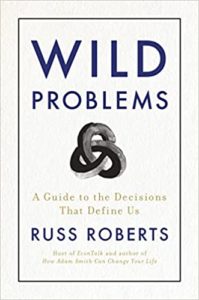We’ve all been super excited waiting for the release of EconTalk host Russ Roberts’ new book, Wild Problems. It’s now out, and both I and Russ hope you all choose to read it! (How else will you catch the chapter on Bill Bellichick?!?!?) This episode is icing on the cake, as Russ brings back Mike Munger- this time to interview him!. (P.S. Many other interviews with Russ are now available. Here’s a link to the one he did recently with Tim Ferriss.)

What are wild problems? The big ones. The decisions where data doesn’t matter, where cost-benefit analysis can be misleading. This has been a challenging kind of problem for Roberts to acknowledge, given his early Chicago-school training. (Don’t miss the part at the end when Munger asks him when he stopped being an economist!) Today, Roberts worries that our apparent obsession with “life hacks” may distract us from the important questions that make life worth living. How’s your quest for a well-lived life coming along? Use the prompts below to help us continue the conversation.
1- Roberts and Munger compare the approach of scholars like Milton Friedman and Gary Becker with that of Frank Knight and James Buchanan. According to Munger, what is the difference between the process of becoming and the process of deciding, and how has this distinction come to shape the way Roberts thinks about wild problems? (And just for fun- how does this also relate to the decision to become a vampire?)
2- About 10 minutes in, Munger and Roberts discuss the pool problem posed by Daniel Gilbert. Why does Munger insist Gilbert’s conclusion is wrong, and to what extent do you agree? What about Roberts’ implicit borrowed claim about the unexamined life not being worth living… should you teach this to your children? (Think again about the pool… would you rather your children be happy for 23 hours and miserable for one, or the reverse?) Are today’s wild problems harder than they were in the past?
3- What is the Secretary Problem, and how does it relate to the problem of finding a life mate? Related, what’s wrong with the way scholars of decision theory think about making these kinds of decisions? Have you ever tried to apply “rational” decision-making to a wild problem (or vice versa)? If so, we’d like to hear how it went!
4- What does it mean to “privilege your principles?” How might someone cultivate being the sort of person that privileges their principles?
5- Consider the story Russ tells about finding a wallet in San Francisco and the one Mike tells about his recent fender bender in the university parking lot. Why do you think each made the choice they did? How much cost was borne in each story? In other words, how costly does virtue need to be to qualify as virtue?

![To Float or Not to Float: Munger and Roberts on the [Un]examined Life](https://www.econtalk.org/wp-content/uploads/2022/08/Depositphotos_58162887_S.jpg)
Comments are closed.